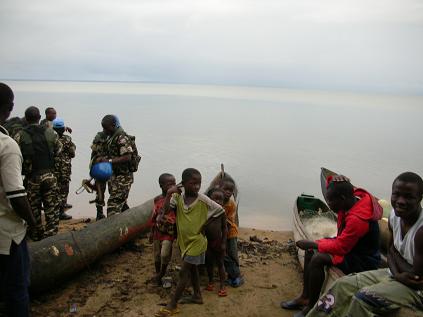
Liberia is the size of Tennessee, with about 2 million fewer people (3.5 million total). It’s about 45% urban, which is kinda high for West Africa, but just below the world average. That might be a little too high, ‘cause the history of successfully developing countries shows that they need real strong rural development before the (essential) stage of urbanizing begins. Food security leads to economic specialization leads to trade leads to growth. C’mon growth!
As in the rest of West Africa, Lebanese businessmen have been pioneers of import commerce. Here they’ve set up restaurants, import/export companies, and a brand new supermarket where you can get Italian prosciutto, South African peanut butter, and decent Spanish wine (at just under New York City prices, which 98% of Liberians can’t afford), as well as sundries like miniature motorcycles. Most of the retail outlets of any size downtown (construction supplies, electronics stores, generator shops) have Lebanese 20-somethings manning the front counter. “They’re in a competition, the Chinese and the Lebanese, to see who can get a tighter hold on commerce,” somebody said. And you can’t blame them for trying; in the words of a very busy Liberian-American computer repair technician, “There’s nobody else here who can do this stuff. It’s virgin territory.”

To the extent that foreign businesses are hiring locals, enriching families, and transferring skills and technology, everyone wins. But let’s just hope that some of the money stays in the country. One Lebanese businessman tells the Ledger that it’s “too easy” to open a business here, admitting that businesses like his are just too much competition for local entrepreneurs. It’s a tough balance to make, especially in a place like this that needs all the services it can get. Local NGOs are angry that Lebanese companies get so many of the contracts to work with the international NGOs. At this early stage after the war, while local people and firms have cash little to invest, a great percentage of economic activity is driven by contracts from the UN and iNGOs.
People who’ve been here a while say they’ve seen amazing changes in the few years since the end of the war. Formal and informal economies are springing to life (which we’ll write about often). On the main drag of UN Drive you find wicked hand-painted signs for haircuts and “Beauty Saloons”, clothes, currency exchange, and other services. Tin shacks called “Business Centers” abound, the name seeming to mean something akin to “little store”. Young guys push modified wheelbarrows selling cassettes, DVDs, and CDs, or brooms, mops, and brushes from China. There’s no shortage of injection-molded plastic buckets, plungers, and dishpans, marbled white and purple or orange. Some established businesses post signs like “NO SELLING ANY TIME” to keep away the vendors of caramels, batteries, and phone cards, but they’re just wasting paint, at least until the city can get a real constabulary up.



0 Comments:
Post a Comment
<< Home